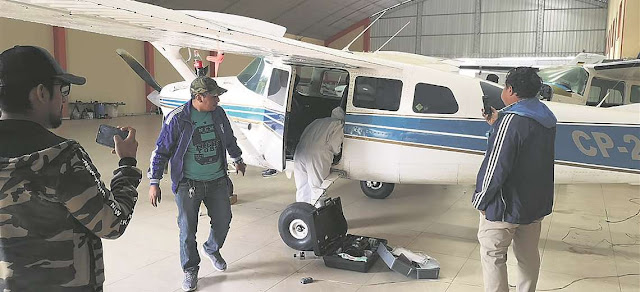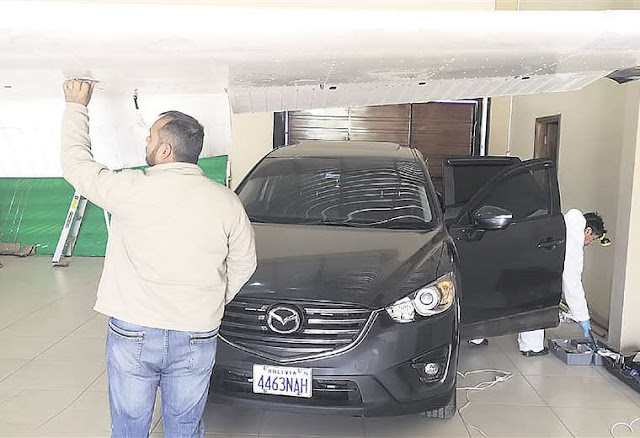In 2019, at the Mondaka airfield in Santa Cruz, planes, weapons, chemicals and vehicles were seized and 15 people were arrested, including a Colombian drug lord. Gunshots were fired, but everything was cancelled by order of Dávila.
An intelligence report from the Special Force to Fight Drug Trafficking, to which EL DEBER had access after investigations and which was secretly registered, uncovers new revelations by Colonel Maximiliano Dávila, former national director of the Felcn.
The former national director of the Special Force against Drug Trafficking (Felcn), man of confidence of former President Evo Morales during the 2019 administration, Maximiliano Dávila, known as 'Macho', with an order left without effect and erased an entire mega-operation of elite anti-drug agents that was practiced in the Mondaka aerodrome, in Santa Cruz, about 20 kilometers from Cotoca.
The document states that seven small planes without back seats, ready to take off with drugs, firearms, satellite telephones, chemical precursors, aviation gasoline, vehicles, supplies, etc. were seized in that action. However, Colonel Maximiliano Dávila gave a decisive order for the release of all, changing reports and statements, thus annulling the mega-operation that favored drug trafficking mafias.
Maximiliano Dávila has been detained in the San Pedro prison in La Paz since January 23, but accused of the crime of legitimizing illicit profits. He is the man who heads the indictment presented by the Grand Jury of the United States to Colombia, requesting the extradition of the ex-cop Omar Rojas Echeverría, imprisoned in that country, as well as eight other drug traffickers, among them Jorge Roca Suárez 'Techo 'e paja'. He is also the high-ranking Felcn chief for whom the United States offered US$ 5 million for the provision of further evidence of his participation in drug trafficking activities.
The secret report of 2019
An official Felcn intelligence report kept secret, accessed by EL DEBER after months of investigations, reveals the forcefulness of an operation carried out when members of an arm of a drug trafficking cartel were discovered in flagrante delicto at the Mondaka airfield, sending cocaine shipments in small planes to Brazil, Argentina, Paraguay, as primary bridges to reach the U.S. and European markets.
At 1:00 a.m. on July 30, 2019, the intelligence services received desperate reports from locals and informants that at the Mondaka aerodrome there were armed men of Colombian, Brazilian, national and other nationalities who would be making private flights in light aircraft without authorization from the General Directorate of Civil Aeronautics (DGAC), from El Trompillo and Viru Viru airports, as well as without control by the Felcn. Likewise, the airplanes had not been subjected to any external or internal review for some time, nor were the pilots' and passengers' documentation checked, and their flight plans lacked control stamps.
Laboratories, weapons and drugs
The report states that "from Mondaka airport they transported and stored aviation fuel for clandestine flights with controlled substances, such as cocaine base paste, cocaine hydrochloride, firearms and food, to resupply people working in cocaine crystallization laboratories located in inaccessible places. These types of controlled substances are reportedly being transported to clandestine airstrips in Paraguay, Brazil and Argentina.
Attack by drug traffickers and gunfire
When the Felcn elite patrols raided the Mondaka airport, the traffickers attacked and the police officers jumped out of their vehicles to avoid falling into their clutches. "On the main road, dirt road to the Mondaka airfield, a vehicle was observed approaching our checkpoint and suspiciously it was without lights, so we made the light signals to stop for control. We were wearing reflective vests and caps and Felcn badges. They did not pay attention and came against us, we had to jump into the ditch because they were going to run us over and they fled. We started the chase. The vehicle entered Mondaka airport and hid in hangar 7".
The report states that "during the operation two heavily armed men ran out to hangar 8 and padlocked the doors. Gunfire was heard against us and to alert the other hangars at the airport. We knocked on the hangar doors, but no one answered and we shouted for them to open the doors. Several subjects hid on the second floor, but others managed to flee and then hid in the bush.
The official account of the operation continues as follows: "We went upstairs and reduced four men and we could see that another one jumped out of the window and fled, but threw a black bag. We conducted a search where we found a black 9mm caliber firearm loaded with 15 projectiles. Inside the bag 25 projectiles were found, in addition to other firearms".
Seven planes without seats
During the mega-operation, the agents found seven parked light aircrafts in the two hangars. They were without rear seats, only for the pilot and co-pilot. Aviation gasoline was also found in containers and they were ready to leave and loaded with controlled substances.
In the hangars, the police found a large amount of provisions to supply the laboratories scattered in different places, as well as precursors and other complements to feed the modern factories.
Satellite telephones, mattresses, blankets, light bulbs and many other items were also seized.
15 arrested and drug lord's vehicle
In the middle of the operation, despite the fact that several people fled, firing shots and forcing the police to draw their weapons for safety and defense, at least 15 men of different nationalities, including Bolivians, Colombians and Brazilians, were captured.
Intelligence reports indicated that among those captured was a Colombian considered to be a drug lord who offered US$100,000 to be released. In addition, his car, license plate 4463-NAH, was seized.
By superior orders
The key report recorded has a fundamental part that even surprised the Felcn officers themselves. It states that "by superior orders of the national chief, Colonel Maximiliano Dávila, given to Colonel Juan Carlos Corrales Ortiz, at that time departmental director of the Felcn of Santa Cruz, I was ordered to modify these reports as well as the statements of the people involved in this case, giving help to the gentlemen". In this way, they were all released and were not brought to the attention of the justice system.
Sucked into the airplanes
The orders did not stop, as experts supposedly from the Institute of Forensic Investigations (IDIF) were summoned for the microaspiration of the seven airplanes with fully identified license plates and registered in the two hangars 7 and 8 of the Mondaka aerodrome, under the supposed control of the DGAC, in order to determine if they were used by drug trafficking networks.
EL DEBER was able to see the intelligence reports which all showed negative results for cocaine, implying that none were used by drug traffickers. However, the secret reports that were being kept revealed that the interested parties or owners paid at least US$50,000 for each aircraft in order to receive them.
Vessels were returned; aspirates were negative
Felcn chiefs before Dávila
The police officers, who in spite of the fact that the actual reports were totally changed in their content, kept another one for the history record, which was accessed by EL DEBER. It points out that the head of the Felcn of Santa Cruz, Colonel Juan Carlos Corrales, and the head of operations, Major Richard Céspedes Quevedo, were immediately summoned to La Paz, directly to Maximiliano Dávila's office. A low-ranking agent said, "I also went to La Paz, I did not enter the office, but I stayed, looked and listened behind the glass door," he said.
After the giant operation in Mondaka, Davila had ordered all investigators separated from the case and was very upset by the action. "I heard Davila call the attention of Colonel Corrales and Cespedes. He told them to separate the investigators, that he never wanted to see them again. My bosses, who were from Santa Cruz, told him that we had to wait because they have the original reports and that they could leak it to the press and then it could seriously affect our government of Evo Morales. Then Dávila grabbed his head and accepted, but he told him that on the condition that those policemen would not touch anything about the case, that they would forget about it".
Another one of the intervened ships in Mondaka aerodrome.
Dávila in San Pedro's Crane
EL DEBER arrived at the San Pedro prison where Maximiliano Dávila has been held since January 23rd.
He is in the Grulla sector, where his comrade and former colonel Gonzalo Medina, implicated in the Pedro Montenegro drug trafficking case, was also detained. It is an environment at the entrance of San Pedro, outside of where the entire population is.
Generally dressed in overalls, he is in good health, but his hair is whiter and a bit thinner.
He walks everywhere, the policemen respect him, greet him, take care of him and he receives visits according to the prison rules.
During the day and at night he is escorted by a plainclothes policeman who wears a police identification badge on his chest.
On February 16, Davila was taken out of San Pedro under strict security measures and taken to the National Thoracic Institute for an apparent hypertensive crisis, but returned to the prison.
The van seized in Mondaka from a Colombian drug lord who was released from prison
For Felcn, Mondaka has high levels of questionable air traffic
The Special Force to Combat Drug Trafficking (Felcn) has recorded in reports that the Mondaka aerodrome, some 20 km from Cotoca, is an emergency terminal. It has hangars and maintenance and mechanical services. From 2019 until now the Felcn records high air traffic of light aircraft with passengers.
Agents who asked for their names to be withheld said that at the entrance of Mondaka they guard, but by superior orders sometimes they let people enter without any review and in the same way airplanes leave without complying with controls that are customary in the airports El Trompillo and Viru Viru. "We don't know if we control or guard the drug traffickers at the entrance to Mondaka," said a Felcn police officer.


No comments:
Post a Comment